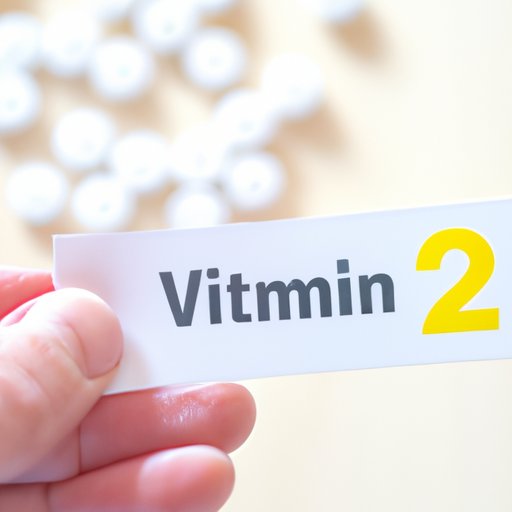
Understanding Vitamin B12: A Comprehensive Guide for Elderly Population
As we age, ensuring our bodies receive the necessary vitamins and minerals becomes increasingly important. One of the key nutrients essential for maintaining overall health in older adults is vitamin B12. This water-soluble vitamin plays a crucial role in cognitive function, nerve function, and red blood cell production. However, getting enough vitamin B12 can be challenging for older adults. In this article, we will explore what is the normal level of vitamin B12 in elderly, the consequences of low vitamin B12 levels, the recommended intake, and practical tips for maintaining optimal levels.
Understanding the Importance of Vitamin B12 for Elderly Health: What You Need to Know
Vitamin B12 is a vital nutrient that contributes to multiple bodily functions. In older adults, it is essential for maintaining cognitive function and reducing the risk of neurological problems such as neuropathy and dementia. Vitamin B12 also plays a significant role in the formation of red blood cells, which helps to prevent anemia. The vitamin B12 found in food sources or supplements is in the form of cobalamin, which the body converts into an active form known as methylcobalamin to be used for the above-listed bodily functions
A Comprehensive Guide to Vitamin B12 Levels in the Elderly: What’s Normal and Why it Matters
The normal level of vitamin B12 in the elderly population is between 200 and 900 pg/mL. However, even values above the 200 pg/ml limit may not guarantee that the person would not experience deficiency symptoms. Low vitamin B12 levels can lead to anemia, neurological problems such as numbness and tingling in the hands and feet, memory loss, disorientation and dementia. It should also be noted that senior citizens with low vitamin B12 levels have a higher risk of osteoporosis and falls
Are You at Risk for Vitamin B12 Deficiency? Understanding the Symptoms and Recommended Intake for Elderly Adults
Older adults are at greater risk of vitamin B12 deficiency due to various factors. Some of which include poor diet, low stomach acid levels, gastrointestinal conditions such as Crohn’s disease, and certain medications like proton pump inhibitors. The symptoms of vitamin B12 deficiency may take years to develop. They include numbness and tingling in the hands and feet, difficulty walking, loss of balance, confusion, and memory loss. The recommended dietary intake for vitamin B12 in elderly adults is 2.4 mcg per day, which can be achieved through consuming 2 to 3 servings of vitamin B12-rich foods per day such as beef, chicken liver, clams, fish and fortified cereals.
The Role of Vitamin B12 in Healthy Aging: Keeping Senior Citizens Strong and Vital
Maintaining adequate vitamin B12 levels in the elderly population supports healthy aging and helps to reduce the risk of numerous health problems. A sufficient vitamin B12 level reduces the risk of weaker bone density, as well as weakness and frailty. Vitamin B12 supplementation in older adults has also been found to improve cognitive function, memory and enhance physical strength.
Vitamin B12: How Much is Enough? A Guide to Assessing Adequate Levels in the Elderly Population
The most common way to assess vitamin B12 levels in the elderly population is by measuring the vitamin in the serum. However, this method may not be able to distinguish between active and inactive forms of the vitamin. A more reliable method of determining adequate vitamin B12 levels is to measure the level of holotranscobalamin. The normal range for holotranscobalamin levels should be over 30 pmol/L. Even values above 200pg/mL may not be sufficient to guarantee that the patient is not suffering from vitamin B12 deficiency symptoms.
Maintaining Optimal Vitamin B12 Levels as We Age: Tips and Suggestions for Seniors
Seniors can maintain adequate vitamin B12 levels through consuming vitamin B12-rich foods such as red meats, fish, poultry, and dairy products or via vitamin B12 supplements. Older adults with gastrointestinal conditions such as Crohn’s disease may need higher doses of vitamin B12 supplements. It’s also essential for seniors to converse with their healthcare provider before taking any supplements and to rule out any underlying nutrient deficiencies or medical conditions.
Taking Control of Your Health: The Importance of Monitoring Vitamin B12 Levels in Elderly Adults
Regular monitoring of vitamin B12 levels is critical for detecting deficiencies early enough to be treated hence, reducing the risk of irreversible neurological problems. Elderly adults above the age of 50 who are vegetarian or vegan, have gastrointestinal conditions or take medications that affect stomach acid production should consult with their physicians to monitor their vitamin B12 levels at least once every three years.
Conclusion
Vitamin B12 is an essential nutrient that is crucial to the health and well-being of older adults. Maintaining adequate vitamin B12 levels in the elderly population promotes cognitive function, supports physical strength, and reduces the risk of various health problems. By consuming a balanced diet, considering vitamin B12 supplementation, speaking with your healthcare provider, and monitoring vitamin B12 levels regularly, older adults can take control of their health and maintain optimal vitamin B12 levels.




